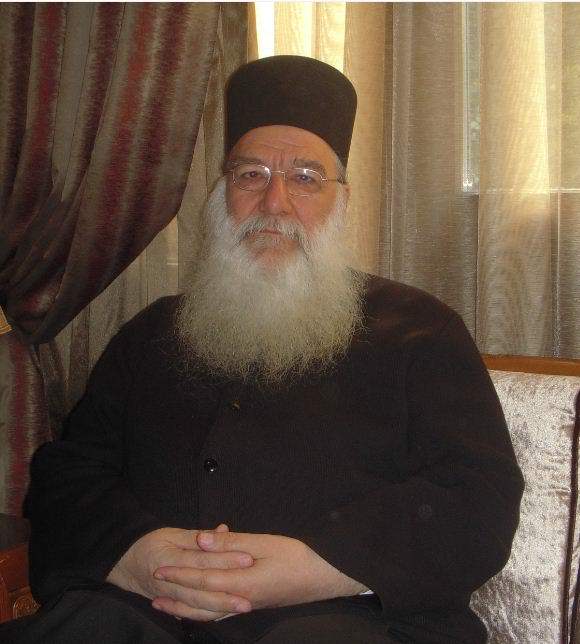Christian Orthodox Spirituality in Fr Moyses’ Poetry
31 March 2016[Previous Publication: http://pemptousia.com/2016/03/athos-ithaca-a-poem-for-orthodox-christian-monasticism/]
Theosis is a distinctive feature that characterizes Orthodoxy and assumes central importance in its overall theological framework.[123] It is the ultimate goal toward which all people should strive and the blessed end for which all things were made.[124] Theosis of man constitutes central subject, prominent aim and purpose and, finally, religious ideal of Orthodoxy.[125] In Orthodoxy, theosis is the very substance of Christianity, because it describes the descent of God to the limit of our fallen human condition and presupposes the union of the created beings with the Divinity.[126]
There is richness of forms of the spiritual life in Orthodoxy, but monasticism remains the most classical of all.[127] The goal of the monastic life is union with God in renunciation of the life of the present world. To reach this union with God, a monk needs continual effort, unceasing vigil and prayer.[128] So, Fr Moyses’ ‘Athos Ithaca’ is an Orthodox poem, since it alludes to the role of monasticism and its importance in Orthodoxy. By advising the young monk, that he should not believe that he reached the end, Fr Moyses implies the significance of ascesis in the monastic life. Ascesis is the only means for the young monk to reach theosis and union with God. Fr Moyses’ poem is a Christian one, because it is associated with the substance of monasticism, which is ascesis.
Conclusions
In this paper, I attempted to demonstrate the influences from Cavafy in Fr Moyses’ poetry. We focused on Cavafy’s ‘Ithaca’ and its reflection in Fr Moyses’ ‘Same Times’ and ‘Athos Ithaca’. Similarly to Cavafy, in ‘Same Times’ Fr Moyses attempts to advise his reader to seek a long and beneficial journey, from which he will gain experience, knowledge and wisdom. These values constitute the reward of the travel. However, Fr Moyses adds a second reward arising from the journey which is not only to receive benefit from the journey, but also to help other people through their own experience, knowledge and wisdom.
In ‘Athos Ithaca’, Fr Moyses combines in the title of his poem Cavafy’s Ithaca with Mount Athos. In that way, Fr Moyses transfers readers to the monastic life of Mount Athos. The poem recalls Cavafy’s advisory character, but in this case, Fr Moyses advises a new monk about monastic life. Having the role of an older monk, Fr Moyses explains to a younger monk that arriving on Mount Athos is just the beginning of the monastic life.
According to Tsiropoulos, Fr Moyses’ poems recall Cavafy’s expression and forms, and they convey thoughts, observations and emotions which are written with kindness and stochastic mind.[129] Also, Gounelas asserts that Fr Moyses’ poetry deals with history, saints and Byzantium and travels outside Greece. Fr Moyses seeks simple words and images which obviously derive from Mount Athos’ atmosphere.[130] Fr Moyses’ words are characterized by devoutness and are inspired by holy tradition and history.[131]
Fr Moyses poems possess a special meaning and spirituality, since they represent readings of a monk-poet, in which he is also present.[132] If poetry is a kind of prayer, this is what Fr Moyses’ intends to do. His poetic contribution is his prayer which is obvious in his poems. Through his poetry, Fr Moyses intends to help his readers.[133] His poems are characterized by the perfume of spiritual fragrance.[134]
[The End]
[123] Daniel B. Clendenin, ‘Partakers of Divinity: The Orthodox Doctrine of Theosis’, Journal of the Evangelical Theological Society 37/3 (September 1994), 365-379; at 366.
[124] Clendenin, ‘Partakers of Divinity’, 366.
[125] Clendenin, ‘Partakers of Divinity’, 366.
[126] Clendenin, ‘Partakers of Divinity’, 366.
[127] Vladimir Lossky, The Mystical Theology of the Eastern Church (Cambridge, 2005), 17.
[128] Lossky, The Mystical Theology, 18.
[129] Kostas Tsiropoulos in Μωυσέως Αγιορείτου, Αθωνικό Ψαλτήρι, 59.
[130] Soteres Gounelas in Μωυσέως Αγιορείτου, Αθωνικό Ψαλτήρι, 57.
[131] Antonis Vazintaris in Μωυσέως Αγιορείτου, Αθωνικό Ψαλτήρι, 61.
[132] Presbyter Konstantinos Kallianos in Μωυσέως Αγιορείτου, Αθωνικό Ψαλτήρι, 55.
[133] Presbyter Konstantinos Kallianos in Μωυσέως Αγιορείτου, Αθωνικό Ψαλτήρι, 55.
[134] Paschos in Μωυσέως Αγιορείτου, Αθωνικό Ψαλτήρι, 59.







